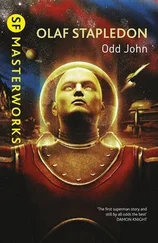Olaf Stapledon - The Complete Sci-Fi Works of Olaf Stapledon
Здесь есть возможность читать онлайн «Olaf Stapledon - The Complete Sci-Fi Works of Olaf Stapledon» — ознакомительный отрывок электронной книги совершенно бесплатно, а после прочтения отрывка купить полную версию. В некоторых случаях можно слушать аудио, скачать через торрент в формате fb2 и присутствует краткое содержание. Жанр: unrecognised, на английском языке. Описание произведения, (предисловие) а так же отзывы посетителей доступны на портале библиотеки ЛибКат.
- Название:The Complete Sci-Fi Works of Olaf Stapledon
- Автор:
- Жанр:
- Год:неизвестен
- ISBN:нет данных
- Рейтинг книги:5 / 5. Голосов: 1
-
Избранное:Добавить в избранное
- Отзывы:
-
Ваша оценка:
- 100
- 1
- 2
- 3
- 4
- 5
The Complete Sci-Fi Works of Olaf Stapledon: краткое содержание, описание и аннотация
Предлагаем к чтению аннотацию, описание, краткое содержание или предисловие (зависит от того, что написал сам автор книги «The Complete Sci-Fi Works of Olaf Stapledon»). Если вы не нашли необходимую информацию о книге — напишите в комментариях, мы постараемся отыскать её.
Novels:
Last and First Men: A Story of the Near and Far Future
Last Men in London
Odd John: A Story Between Jest and Earnest
Star Maker
Darkness and the Light
Sirius: A Fantasy of Love and Discord
Death into Life
Short Stories:
The Flames (1947)
The Seed and the Flower
The Road to the Aide Post
A Modern Magician
East is West
A World of Sounds
Arms Out of Hand
The Complete Sci-Fi Works of Olaf Stapledon — читать онлайн ознакомительный отрывок
Ниже представлен текст книги, разбитый по страницам. Система сохранения места последней прочитанной страницы, позволяет с удобством читать онлайн бесплатно книгу «The Complete Sci-Fi Works of Olaf Stapledon», без необходимости каждый раз заново искать на чём Вы остановились. Поставьте закладку, и сможете в любой момент перейти на страницу, на которой закончили чтение.
Интервал:
Закладка:
The little Siberian settlement was now hard-pressed but single-minded. Calculation had convinced the scientists that the planet would not return to its normal state for some millions of years; for though the first and superficial fury of the disaster had already ceased, the immense pent-up energy of the central explosions would take millions of years to leak out through volcanic vents. The leader of the party, by rare luck a man of genius, conceived their situation thus. For millions of years the planet would be uninhabitable save for a fringe of Siberian coast. The human race was doomed for ages to a very restricted and uncongenial environment. All that could be hoped for was the persistence of a mere remnant of civilized humanity, which should be able to lie dormant until a more favourable epoch. With this end in view the party must propagate itself, and make some possibility of cultured life for its offspring. Above all it must record in some permanent form as much as it could remember of Patagonian culture. ‘We are the germ,’ he said. ‘We must play for safety, mark time, preserve man’s inheritance. The chances against us are almost overwhelming, but just possibly we shall win through.’
And so in fact they did. Several times almost exterminated at the outset, these few harassed individuals preserved their spark of humanity. A close inspection of their lives would reveal an intense personal drama; for, in spite of the sacred purpose which united them, almost as muscles in one limb, they were individuals of different temperaments. The children, moreover, caused jealousy between their parentally hungry elders. There was ever a subdued, and sometimes an open, rivalry to gain the affection of these young things, these few and precious buds on the human stem. Also there was sharp disagreement about their education. For though all the elders adored them simply for their childishness, one at least, the visionary leader of the party, thought of them chiefly as potential vessels of the human spirit, to be moulded strictly for their great function. In this perpetual subdued antagonism of aims and temperaments the little society lived from day to day, much as a limb functions in the antagonism of its muscles.
The adults of the party devoted much of their leisure during the long winters to the heroic labour of recording the outline of man’s whole knowledge. This task was very dear to the leader, but the others often grew weary of it. To each person a certain sphere of culture was assigned; and after he or she had thought out a section and scribbled it down on slate, it was submitted to the company for criticism, and finally engraved deeply on tablets of hard stone. Many thousands of such tablets were produced in the course of years, and were stored in a cave which was carefully prepared for them. Thus was recorded something of the history of the earth and of man, the outlines of physics, chemistry, biology, psychology, and geometry. Each scribe set down also in some detail a summary of his own special study, and added a personal manifesto of his own views about existence. Much ingenuity was spent in devising a vast pictorial dictionary and grammar, with which, it was hoped, the remote future might interpret the whole library.
Years passed while this immense registration of human thought was still in progress. The founders of the settlement grew feebler while the eldest of the next generation were still adolescent. Of the two women, one had died and the other was almost a cripple, both martyrs to the task of motherhood. A youth, an infant boy, and four girls of various ages—on these the future of man now depended. Unfortunately these precious beings had suffered from their very preciousness. Their education had been bungled. They had been both pampered and oppressed. Nothing was thought too good for them, but they were overwhelmed with cherishing and teaching. Thus they came to hold the elders at arm’s length, and to weary of the ideals imposed on them. Brought into a ruined world without their own consent, they refused to accept the crushing obligation toward an improbable future. Hunting, and the daily struggle of a pioneering age, afforded their spirits full exercise in courage, mutual loyalty, and interest in one another’s personality. They would live for the present only, and for the tangible reality, not for a culture which they knew only by hearsay. In particular, they loathed the hardship of engraving endless verbiage upon granitic slabs.
The crisis came when the eldest girl had crossed the threshold of physical maturity. The leader told her that it was her duty to begin bearing children at once, and ordered her to have intercourse with her half-brother, his own son. Having herself assisted at the last birth, which had destroyed her mother, she refused; and when pressed she dropped her graving tool and fled. This was the first serious act of rebellion. In a few years the older generation was deposed from authority. A new way of life, more active, more dangerous, zestful, and careless, resulted in a lowering of the community’s standard of comfort and organization, but also in greater health and vitality. Experiments in plant and stock-breeding were neglected, buildings went out of repair; but great feats of hunting and exploration were undertaken. Leisure was given over to games of hazard and calculation, to dancing, singing, and romantic story-telling. Music and romance, indeed, were now the main expression of the finer nature of these beings, and became the vehicles of obscure religious experience. The intellectualism of the elders was ridiculed. What could their poor sciences tell of reality, of the many-faced, never-for-a-moment-the-same, superbly inconsequent, and ever-living Real? Man’s intelligence was all right for hunting and tillage in the world of common sense; but if he rode it further afield, he would find himself in a desert, and his soul would starve. Let him live as nature prompted. Let him keep the young god in his heart alive. Let him give free play to the struggling, irrational, dark vitality that sought to realize itself in him not as logic but as beauty.
The tablets were now engraved only by the aged.
But one day, after the infant boy had reached the early Patagonian adolescence, his curiosity was roused by the tail-like hind limbs of a seal. The old people timidly encouraged him. He made other biological observations, and was led on to envisage the whole drama of life on the planet, and to conceive loyalty to the cause which they had served.
Meanwhile, sexual and parental nature had triumphed where schooling had failed. The young things inevitably fell in love with each other, and in time several infants appeared.
Thus, generation by generation, the little settlement maintained itself with varying success, varying zestfulness, and varying loyalty toward the future. With changing conditions the population fluctuated, sinking as low as two men and one woman, but increasing gradually up to a few thousand, the limit set by the food capacity of their strip of coast. In the long run, though circumstances did not prevent material survival, they made for mental decline. For the Siberian coast remained a tropical land, bounded on the south by a forest of volcanoes; and consequently in the long run the generations declined in mental vigour and subtlety. This result was perhaps due in part to too intensive inbreeding; but this factor had also one good effect. Though mental vigour waned, certain desirable characteristics were consolidated. The founders of the group represented the best remaining stock of the first human species. They had been chosen for their hardihood and courage, their native loyalty, their strong cognitive interest. Consequently, in spite of phases of depression, the race not only survived but retained its curiosity and its group feeling. Even while the ability of men decreased, their will to understand, and their sense of racial unity, remained. Though their conception of man and the universe gradually sank into crude myth, they preserved a strong unreasoning loyalty towards the future, and toward the now sacred stone library which was rapidly becoming unintelligible to them. For thousands and even millions of years, after the species had materially changed its nature, there remained a vague admiration for mental prowess, a confused tradition of a noble past, and pathetic loyalty toward a still nobler future. Above all, internecine strife was so rare that it served only to strengthen the clear will to preserve the unity and harmony of the race.
Читать дальшеИнтервал:
Закладка:
Похожие книги на «The Complete Sci-Fi Works of Olaf Stapledon»
Представляем Вашему вниманию похожие книги на «The Complete Sci-Fi Works of Olaf Stapledon» списком для выбора. Мы отобрали схожую по названию и смыслу литературу в надежде предоставить читателям больше вариантов отыскать новые, интересные, ещё непрочитанные произведения.
Обсуждение, отзывы о книге «The Complete Sci-Fi Works of Olaf Stapledon» и просто собственные мнения читателей. Оставьте ваши комментарии, напишите, что Вы думаете о произведении, его смысле или главных героях. Укажите что конкретно понравилось, а что нет, и почему Вы так считаете.












